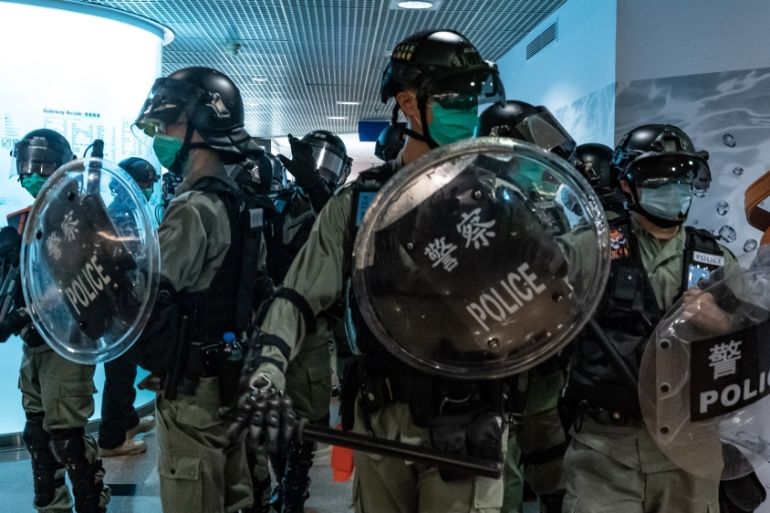Hong Kong probe exonerates police over protest handling
Watchdog’s long-awaited report absolved police of wrong-doing and recommended a review of operational guidelines.

The long-overdue report from the watchdog into the policing of the protests that have wracked Hong Kong for nearly a year has concluded that the use of force by the police was a result of “illegal action by protesters” and that allegations of police brutality should not be used as a “political weapon”.
In the 999-page report, the Independent Police Complaints Council (IPCC) made 52 recommendations to the police on strengthening operational guidelines. The accountability of individual officers was not within the scope of the report, it stressed.
Keep reading
list of 3 itemsInternational experts quit Hong Kong police protest probe
China slams ‘terrorist-like actions’ by Hong Kong protesters
“While labelling Police action as ‘brutality’, the protesters seem to disregard their own violence, vandalism and vigilantism,” the report found. “It cannot be overemphasised that allegations of police brutality must not be made a weapon of political protest. That is a legal and not a political matter.”
The IPCC was set up to assess police conduct in the handling of protests that began in June as the government tried to push through legislation that would have allowed people to be sent to mainland China for trial.
|
|
From peaceful marches that attracted hundreds and thousands of people, the protests evolved into a wider call for democratic reforms and some descended into violent street confrontations.
The report absolved the police of collusion in the Yuen Long incident in July when protesters were attacked by a mob of armed men. The IPCC acknowledged that the incident had attracted the most number of complaints but said no “serious evidence” had been offered to back up the claims.
The commission’s members were chosen by Hong Kong leader Carrie Lam who described the report as “weighty” and said the government accepted it.
A group of five international advisers resigned in December citing doubts about its “independent investigative capability”. The commission relies on voluntary disclosure and has no investigatory powers of its own.
Lethal force
Police, clad in riot gear and sometimes without identification, have used a barrage of tear gas, water cannon and rubber bullets in response to the protests. The IPCC noted that the police had used lethal force in “only 12 instances” and fired 19 live rounds.
Protesters broke through cordons to storm the legislature last June on the day the bill was supposed to have had its second reading, and as the weeks wore on showed a willingness to adopt more violent tactics, using slingshots, and throwing bricks and petrol bombs.
“In the face of these illegal and potentially lethal acts, the Police has had to enforce the law and to protect themselves and the community from harm,” the IPCC said.
Some 542 complaints had been made against the police, the report said, with 96 of them for assault. Most of those were made by those who had been arrested.
|
|
Later on Friday, the first protester to plead guilty to rioting over legislature attacks was sentenced to four years in prison in what the judge described as a “direct attack on the rule of law, which undoubtedly caused harm”.
Sin Ka-ho, 21, admitted to pushing through police barricades and throwing umbrellas and other objects at police officers. More than 8,300 people have been arrested and 595 face charges of rioting, which carries a maximum sentence of 10 years.
The protesters accuse the police of using excessive force and other abuses, and an independent investigation into allegations of police brutality has become one of their key demands along with universal suffrage.
The police have maintained their response has been proportionate to the level of violence.
Hong Kong was formerly a British colony and was handed back to China in 1997 under the so-called “one country, two systems” framework that allows the territory freedoms unknown on the mainland.